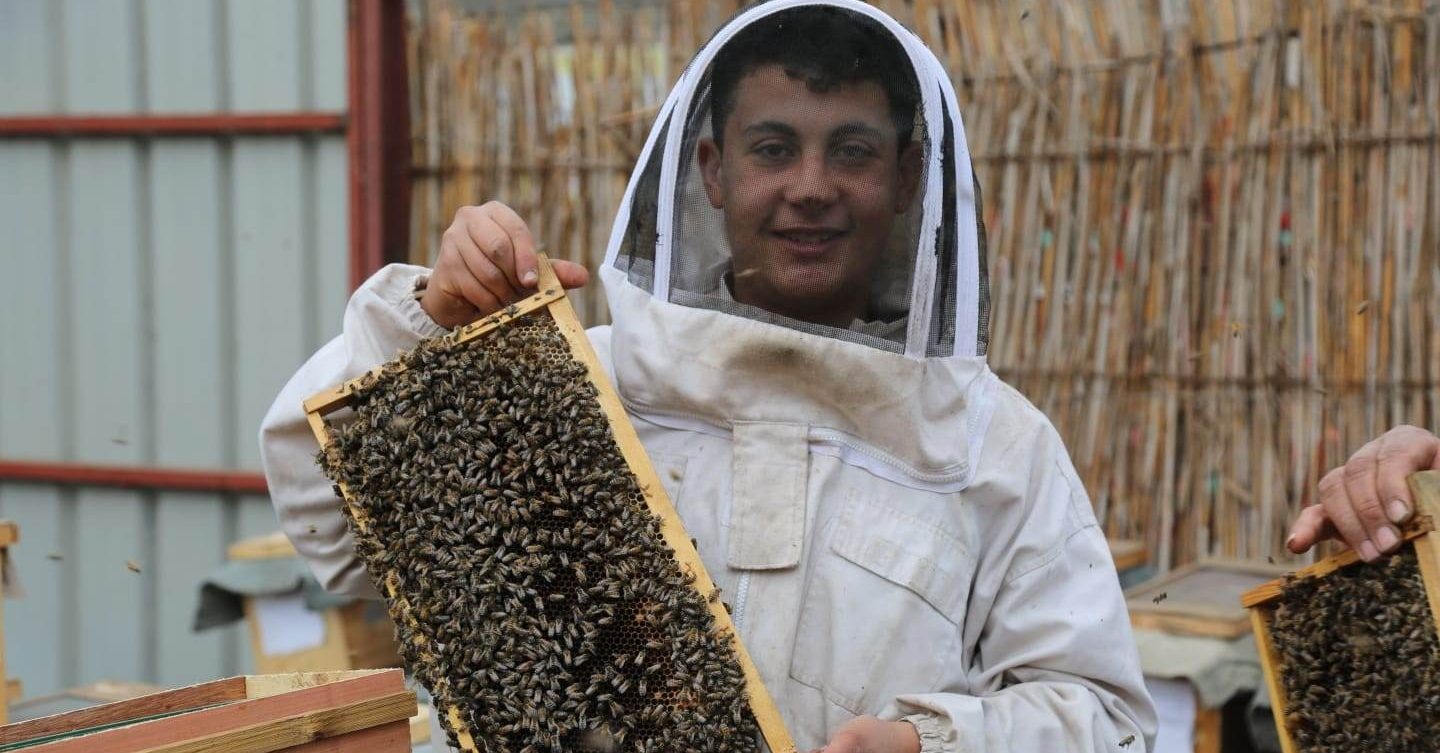The sound of thousands of hives lining rooftops, gardens, and fields echoes in the small village of Shabshir al-Hissa in Egypt’s Nile Delta, where bees outnumber people. For years, the village has been a place where honey is a tradition, where livelihoods, remedies, and pride all stem from the hive.
Nestled in Gharbia Governorate, Shabshir al-Hissa is the country’s undisputed capital of beekeeping. According to Abdelsalam Osman, head of the Egyptian Beekeepers Association in Gharbia, around 3,000 people in Shabshir al-Hissa work with bees. Some raise them, others make hives, process wax, bottle honey, or manage exports.
Although Shabshir and Hissat Shabshir are home to fewer than 18,000 people, the two villages produce more than 70 percent of Egypt’s honey.
That generational craft defines Shabshir’s identity. Families pass the trade like an heirloom. “We were born among bees. My grandfather had bees, my father worked with bees, I did, and now my son too,” Osman told Egyptian Streets, noting that it is their only profession. “Every house has hives, every family lives from bees.”
The Challenges of Changing Seasons
The beekeeping calendar in Shabshir begins in February and March, when the air begins to warm up, and the season starts. Beekeepers help their colonies rebuild after winter, dividing strong hives into new ones for sale or export.
The first honey harvest arrives in April, during the citrus blossom season in Beheira. “We move our bees to the orange groves,” said the Computers and Information graduate turned beekeeper, and founder of Al-Rowad for Beekeeping Supplies and Products, Mahmoud Abdulaziz. “You can even smell the sweet orange blossom scent in the air.”
By May and June, clover honey, known locally as barseem, takes over Egypt’s most prized and profitable variety. Upper Egypt produces fennel and alfalfa honey, but Shabshir’s beekeepers focus on the northern blooms that thrive in the Delta’s fertile soil.
Still, the rhythm of the bees has begun to shift. Prolonged winters and irregular rain patterns mean colonies stay weaker for longer, threatening early-season production.
According to Abdelaziz, climate change delayed the honey production. He said, “They used to swarm in January. Now, not before March.”
The Art and Strain of Survival
If Shabshir’s bees are industrious, their keepers are resilient. In recent years, the trade has come under strain from every side: economic crisis, environmental loss, and government neglect.
“Before 2020, I had 4,000 hives. Now I have only 1,000,” Osman said. “Every year, I sell some because I can’t afford to keep them.”
Sugar, once EGP 5,500 (USD 116) per ton, has become scarce and costly, a heavy blow for beekeepers, who rely on it to feed their colonies when nectar runs dry in the winter. “Bees live on nectar,” he explained, “but when there’s none, we feed them sugar syrup so they don’t die. It’s not cheating, because without it, they’d starve and die.”
Worker wages, too, have tripled. “A worker who earned EGP 3,000 (USD 63) now wants EGP 9,000 (USD 189.8). So we let go of workers,” he said.
Pesticides on citrus and cotton crops have also devastated colonies. Osman explained that he used to move his hives to orange groves during the citrus blossom season so the bees could forage on the flowers and would return with strong, healthy colonies. Now, he said, he often comes back to find many of his hives dead.
The eucalyptus trees that once lined irrigation canals, vital for forage, were cut down when the canals were cemented. “There’s nothing left for the bees to live on.”
Osman warned that if bees disappear from Egypt, the country will lose more than honey. He said, “Bees increase crop yields by 30 to 70 percent. They’re a blessing from Allah [God]. Everything they make is useful: honey, pollen, royal jelly, propolis, even venom.”
According to a 2021 study on bee pollination and its economic value for crop production, Bee pollination raises cotton yields to about 62 percent, compared with only 37 percent without it. The absence of bee pollination is estimated to cost Egypt roughly EGP 13.5 billion (USD 284.8 million) each year in lost production of key crops, including melons and alfalfa.
Yet, without nectar-rich landscapes, the insects are starving. The loss of cotton cultivation and pesticide-heavy citrus farming has stripped much of their food sources. Climate shifts have made once-reliable flowering seasons unpredictable.
Egypt’s bee population remains under a silent threat, with numbers decreasing, according to the Food and Agriculture Organization of the United Nations (FAO).
Though comprehensive data in Egypt is scarce, what exists paints a worrying picture of shrinking forage, rising hive mortality, and dwindling profits for those who keep them alive.
“When a beekeeper loses his hives to fire or theft, the other beekeepers gather two hives from each of us to rebuild his apiary,” Osman noted, highlighting that the community remains Shabshir’s saving grace. “That’s how we survive, by helping each other.”
While the Egyptian Beekeepers Association in Gharbia, led by Osman, provides training, advice, and technical support, there is no financial aid.
“We have no funding,” he said. “Sometimes we pay the rent for our workshop from our own pockets. Still, we do it.”
Such solidarity is social, but more importantly, existential. In a village where bees are the lifeblood, mutual aid ensures continuity when institutions fail.
“Beekeeping in Egypt is like an illegitimate child, no one recognizes it,” Osman said.
Egypt’s honey, especially its clover and citrus varieties, has a strong reputation in the Arab world. Shabshir’s exports reach Saudi Arabia, the UAE, Kuwait, Qatar, Libya, and even parts of Africa.
While Egyptian honey sells, quality remains uneven — a concern that beekeepers blame on unethical producers diluting real honey with sugar syrup.
“The difference depends on conscience, not the label,” Abdulaziz said. “Some honey is real, and some is not. That’s the truth everywhere.”
Honest producers say they are paying the price for others’ shortcuts. Without stricter quality oversight or export regulation, Egypt’s honey risks losing credibility abroad, even as demand grows.
While Egypt exports 1.3 million bee packages a year, the profit left for beekeepers, who spend money on dealing with exporting, remains little.
Ingenuity in the Hive
Yet, amid neglect, Shabshir’s ingenuity flourishes. The Al-Rowad Institution has become a symbol of that spirit, manufacturing wax foundation sheets, solid feed known as bee candy, and the very machines needed to make them — all locally.
“We make our own machines now,” Abdulaziz shared. The wax sheet-making machine, which costs USD 52,000 (EGP 2.5 million), is usually imported from Germany. Once shipping and customs fees are added, the total cost could reach EGP 5 million (USD 105,466).
“We manufacture it locally for a fraction of the cost and sell it for around USD 20,000 (EGP 948,172),” Abdulaziz shared, noting that his business partner, Mostafa Shalaby, is the brains behind it. Their workshop sells equipment across Egypt and North Africa, fueling a quiet revolution in small-scale manufacturing.
This resourcefulness echoes throughout the village. In workshops lit by single bulbs, young men carve hive boxes and hammer metal frames, learning by watching their fathers. Some workers make hives, and others export honey.
It is a portrait of self-reliance and family identity in Shabshir, where children grow up in the trade, honey jars double as medicine, and tales of lost hives or good harvests spread faster than news.
But, beneath the hum of the hives lies uncertainty. “We try to endure and adapt by reducing hive numbers and helping each other,” Osman said, noting that while they manage to survive, the village’s resilience is not without limits, as costs rise and forage declines, fewer young people stay.
Osman pleads for nothing more than support. “We’re not asking for money, just attention. Support beekeeping, and you support agriculture, exports, and thousands of families. Ignore it, and all this will disappear, the bees, the carpenters, the wax makers, everything.”







Comments (0)